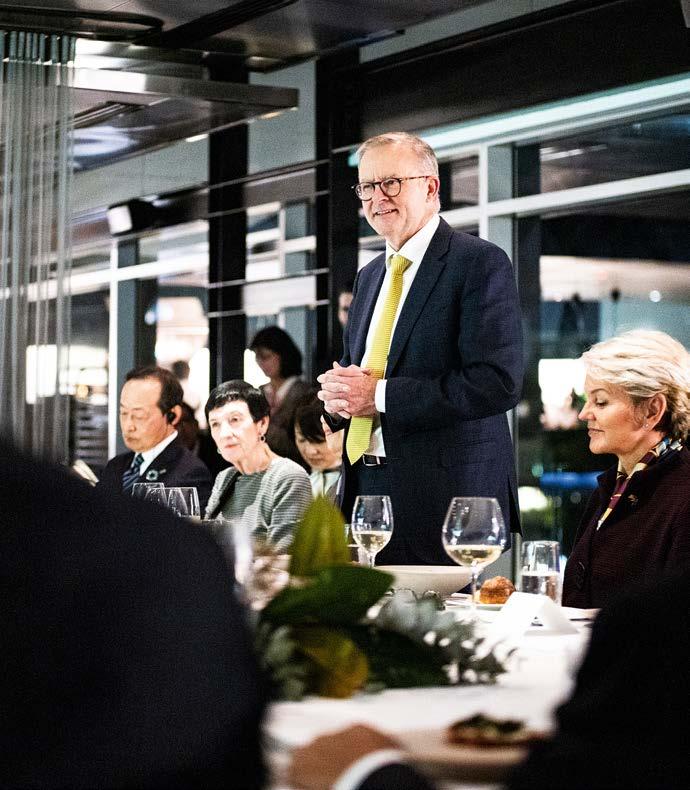
3 minute read
Comparisons with Australia
Europeans understood that Australia’s Coalition government was not supportive of renewable energy developments which has led to some confusion and maybe some misunderstanding over our position.
Call to action
Advertisement
What was evident during European conferences was the absence of an outcry for government support to make things possible, rather a rallying call to industry to say we need to collaborate and push this ahead faster. That’s not to say targets and other policy levers will be useful in that capacity, they will assist.
As to projects, I think Australia might help the EU in terms of trial projects because a lot of their trial projects are end-use such as hydrogen refuelling stations for buses or refilling stations for cars and trucks, or trials of hydrogen used in homes. And much of it is fossil hydrogen, the trials and tests are to help familiarise people with the infrastructure, to get that in place then worry about decarbonisation later.
Sadly in the interim it appears coal use is rising in Europe which isn’t surprising given the geopolitical forces at play but it is disappointing. But there is an expectation for a massive scaling up of renewable energy.
This is all very timely and Australia has such a massive advantage, there’s a lot more room here and our resources are better.
Fertilisers
The issue of fertilisers was raised many times in Europe, bearing in mind grain supplies to Africa; the expectation is that hydrogen needed for fertilisers will be sourced from low carbon or renewable resources and it’s almost a no brainer to build capacity, ditto renewable ammonia.
One interesting point made was that we might actually see a relocation of mass industry as a result of this so there are production facilities dotted around North Africa to make fertilisers, ie position the fertiliser plant either next door or as close to the hydrogen production hub as you can.
We’re likely to see the relocation of fertiliser production facilities and even metals production facilities. You’ll see steel or fertilisers being made out of North Africa and then shipped in its final form to wherever it needs to go rather than shipping the hydrogen or the ammonia up to a hub in Norway to make into fertiliser to then be distributed.
It certainly makes sense in having the commodities in proximity. It makes so much sense to press on with green hydrogen in Australia, the economics are just so positive; potentially we can participate and be one of the top three leading suppliers of renewable hydrogen exports.
Reflections on Australia’s position
It makes so much sense to press on with green hydrogen in Australia, the economics are just so positive; potentially we can participate and be one of the top three leading suppliers of renewable hydrogen exports.
But we do need to get up to speed on the certification discussion; there’s a real understanding now in the EU that a certification scheme for hydrogen needs to assess emissions. It doesn’t need to talk about what colour the hydrogen is, it doesn’t necessarily need to stay where it comes from, but it does need to focus on the emissions per kilo.
We also need to be cognisant of carbon taxes and border adjustment mechanisms that will impact products when setting up an offtake agreement.
These are some of the critical aspects for the next phase.
In terms of policy clarity and infrastructure responsibilities there has been some movement on each of those sectors in Australia recently, NSW is probably one of the clear leaders in that space given they have outlined a road map for hydrogen uptake in terms of capacity of electrolysers that they want to see deployed and the number of hydrogen-powered vehicles that they want to see on the road.
Beyond that, agreements with the Queensland and Victorian governments to start developing a hydrogen highway on the east coast, infrastructure policy and more.
But we need to come together nationally and raise ambition, we need more clarity from the federal government to take us forward and to integrate systems, clear communication between ministers responsible for portfolios affected by energy such as water, also agriculture which will be more heavily reliant on fertilisers produced using hydrogen.
When I left Europe I was feeling rather frustrated but now I’m hopeful, even reasonably optimistic that we can make up the distance because we have a good green hydrogen industry that’s engaged and we can move fast.










